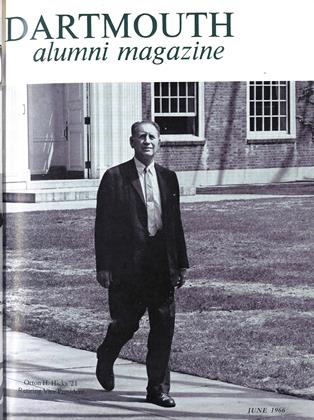After an "exciting and hectic" meeting that lasted nearly three hours, the Faculty voted its acceptance of a resolution proposed by the Committee on Educational Policy that the Great Issues course be suspended for the coming academic year. Since GI is now a course required for the A.B. degree, the Faculty's vote must receive final approval from the Board of Trustees before the ultimate future of GI is determined.
A post-World War II innovation that quickly gained wide recognition and was used as a model for similar courses at other institutions, Great Issues in this decade was increasingly the target of student criticism. The Faculty vote recommending suspension came before the conclusion of an academic year that began at Convocation with President Dickey asking the question: "Are we ready on both sides of this academic community, faculty and student body, to give fuller effect to the basic aims of the Great Issues Course by turning over to a student steering committee the responsibility for planning and administering the program of the Course, leaving to a faculty advisory committee the setting of examinations and oversight of the experiment?"
The Great Issues program for the second and third terms this year was conducted by combined faculty-student committees headed by Dean of the Tucker Foundation Richard P. Unsworth and Prof. William W. Ballard '28.
The resolution voted by the Faculty proposed that the President of the College be requested to organize and direct a reduced program of lectures and panel discussions for seniors for the 1966-67 academic year, that "the General Lecture Series be strengthened and a Committee be appointed to plan and direct it," and that "a Special Committee be appointed to report to the Faculty by March 1967 on measures that should be taken outside of existing departmental and other programs, to strengthen liberal learning at Dartmouth; and, in relation to this inquiry, to make recommendations as to the disposition of the Great Issues requirement."
Although the shape of future all-Senior Class sessions is uncertain, the Faculty's intent is not. As stated in the Committee on Educational Policy's recommendation, the "certain goals of liberal learning . . . may be defined in general terms as a common experience for Dartmouth Seniors that enhances the intellectual impact of the College; personal and direct contact with men and women committed to and deeply involved in important problems and issues; and the promotion of a sense of common purpose in the Dartmouth experience."
If the Trustees agree, Great Issues as an operational approach passes from the scene. But its goals remain and will soon find new form and, hopefully, the student response and cooperation so lacking in GI's last weeks.
 View Full Issue
View Full Issue
More From This Issue
-
 Feature
FeatureThe Lifelong Association of Thayer and Ticknor
June 1966 By COLONEL ROBERT S. DAY, USA -
 Feature
FeatureRETIRING FACULTY
June 1966 -
 Feature
FeatureAlumni Chief Retires This Month
June 1966 By CLIFFORD L. JORDAN '45 -
 Feature
FeatureDr. Carleton B. Chapman Appointed Dean of Dartmouth Medical School
June 1966 -
 Article
ArticleWith the Big Green Teams
June 1966 By PETE GOLENBOCK '67 -
 Class Notes
Class Notes1932
June 1966 By JILDO CAPPIO, ALBERT C. BONCUTTER







